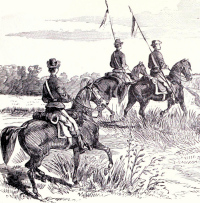Camp Hudson, October 15th. We moved at seven o’clock this morning. For the first four miles the road ran through woods intersected by small streams. The ground was as rough as it could well be, and the teams which had started before us were struggling through the mire and over the rocks. We dashed past them at a fast trot, and in half an hour came upon a high prairie. The prairies of Southern Missouri are not large and flat, like the monotonous levels of Central Illinois, but they are rolling, usually small, and broken by frequent narrow belts of timber. In the woods there are hills, rocky soil, and always one, often two streams, clear and rapid as a mountain-brook in New England.
The scenery to-day was particularly attractive, a constant succession of prairies surrounded by wooded hills. As we go south, the color of the forest becomes richer, and the atmosphere more mellow and hazy.
During the first two hours we passed several regiments of foot. The men were nearly all Germans, and I scanned the ranks carefully, longing to see an American countenance. I found none, but caught sight of one arch-devil-may-care Irish face. I doubt whether there is a company in the army without an Irishman in it, though the proportion of Irishmen in our ranks is not so great as at the East.
Early in the afternoon we rode up to a farm-house, at the gate of which a middle-aged woman was standing, crying bitterly. The General stopped, and the woman at once assailed him vehemently. She told him the soldiers had that day taken her husband and his team away with them. She said that there was no one left to take care of her old blind mother, –at which allusion, the blind mother tottered down the walk and took a position in the rear of the attacking party, – that they had two orphan girls, the children of a deceased sister, and the orphans had lost their second father. The assailants were here reinforced by the two orphan girls. She protested that her husband was loyal, –“Truly, Sir, he was a Union man and voted for the Union, and always told his neighbors Disunion would do nothing except bring trouble upon innocent people, as indeed it has,” said she, with a fresh flood of tears. The General was moved by her distress, and ordered Colonel E. to have the man, whose name is Rutherford, sent back at once.
A few rods farther on we came to another house, in front of which was another weeping woman afflicted in the same way. Several little flaxen-haired children surrounded her, and a white-bearded man, trembling with age, stood behind, leaning upon a staff. Her earnestness far surpassed that of Mrs. Rutherford. She wrung her hands, and could hardly speak for her tears. She seized the General’s hand and entreated him to return her husband, with an expression of distress which the hardest heart could not resist. The General comforted the poor woman with a few kind words, and promised to grant what she asked.
It is very difficult to refuse such requests, and yet, in point of fact, no great hardship or sacrifice is required of these men. They profess to he Union men, but they are not in arms for the Union, and a Federal general now asks of them that they shall help the army for a day with their teams. To those who come here from all parts of the nation to defend these homes this does not appear to be a harsh demand.
We arrived at camp about five o’clock. Our day’s march was twenty-two miles, and the wagons were far behind. A neighboring farm-house afforded the General and a few of his officers a dinner, but it was late in the evening before the tents were pitched.
Fremont’s Hundred Days in Missouri was published in three installments in The Atlantic Monthly. The anonymous author appears to have been a member of Fremont’s staff with a disdainful bias towards Missourians, even those who were pro-Union.
